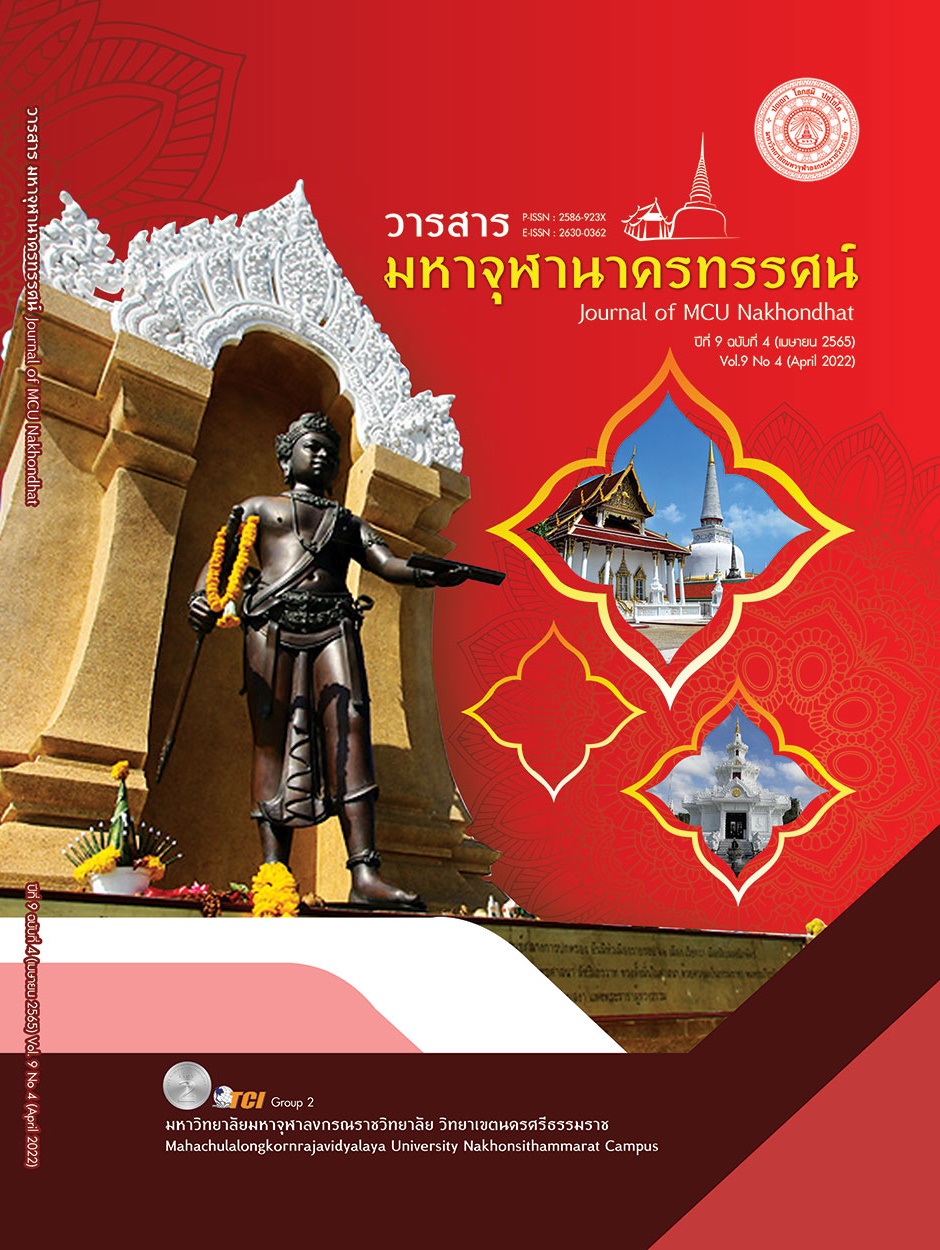SUFFICIENCY ECONOMY PHILOSOPHY MODEL: RECODING TO PRACTICE GUIDELINE FOR SUSTAINABLE DEVELOPMENT
Main Article Content
Abstract
A simplified model of the Sufficiency Economy Philosophy implementation process it starts with people who are virtuous in using their knowledge to make informed decisions. And lead to behavior to achieve the goals according to the vision such as a caring society the process is the first step, virtues, and attributes, such as generosity coupled with knowledge; in the second step, the creation of a body of knowledge, for example, some people are disadvantaged in society and create a well-informed attitude. Self-sufficiency awareness, for example, should help the disadvantaged and then motivate them to act. Step 4: Actions and behaviors, such as supporting and helping them, lead to results. Step 5: Productivity and outcomes, such as creating social reconciliation, etc., which the model follows the philosophy of sufficiency or the principle of sufficiency, using a simple method to remember that “model 2-3-4-5” which comes from 2 conditions: “morality governs knowledge” 3 principles ready. Together, which is “moderation, rational, immune”, 4 dimensions are balanced, which are “economic, social, environmental, cultural” and 5 steps of the operational process, which are guidelines for sustainable development. And sufficiency or sufficiency attributes are characteristics that are expressed or practiced on a regular and consistent basis that encompass both productivity and outcomes. It is a balance in 4 dimensions: 1) economic dimension, 2) social dimension, 3) environmental dimension, and 4) cultural dimension. Is it the sustainability of the quality of life well-being consists of three dimensions: 1) self-reliant, 2) immune, and 3) resilient.
Article Details

This work is licensed under a Creative Commons Attribution-NonCommercial-NoDerivatives 4.0 International License.
References
เกษม วัฒนชัย และจิรายุ อิศรางกูร ณ อยุธยา. (2555). CSR ตามหลักปรัชญาของเศรษฐกิจพอเพียง. กรุงเทพมหานคร: ดาวฤกษ์ คอมมูนิเคชั่นส์.
เอกกนก พนาดำรง. (2560). มุ่งสู่องค์กรแห่งการเรียนรู้ด้วย KM แถลงการณ์การแพทย์ศิริราช. เรียกใช้เมื่อ 14 พฤศจิกายน 2564 จาก https://he02.tci-thaijo.org/index.php /simedbull/article/view/ 81446
กัณญาณัฐ เสียงใหญ่ และศิริวรรณ วิสุทธิรัตนกุล. (2564). ความสําเร็จของเป้าหมายการพัฒนาที่ยั่งยืนเพื่อการพัฒนาประเทศไทย. วารสารรัชต์ภาคย์, 15(43), 14-24.
จิรายุ อิศรางกูร ณ อยุธยา และปรียานุช ธรรมปิยา. (2557). ตามรอยพ่อชีวิตพอเพียงสู่การพัฒนาที่ยั่งยืน. กรุงเทพมหานคร: อมรินทร์พริ้นติ้งแอนด์พับลิซซิง.
ปรียานุช ธรรมปิยา. (2560). หลักปรัชญาของเศรษฐกิจพอเพียงสู่ความยั่งยืน. ใน เอกสารประกอบการบรรยายศูนย์สถานศึกษาพอเพียง มูลนิธิยุวสถิรคุณ, 9 กันยายน 2560 . โรงแรมตรัง เขตดุสิต กรุงเทพมหานคร.
ผู้จัดการออนไลน์. (2561). มุ่งสู่การพัฒนาที่ยั่งยืน ถอดรหัสแนวปฏิบัติใหม่ จากปรัชญาเศรษฐกิจพอเพียง. เรียกใช้เมื่อ 23 ตุลาคม 2564 จาก https://mgronline.com /greeninnovation/detail/
มูลนิธิชัยพัฒนา. (2564). เศรษฐกิจพอเพียง. เรียกใช้เมื่อ 14 ธันวาคม 2564 จาก https://www.chaipat. or.th/site_content/item/1309-2010-06-03-09-50-07.html
ราชกิจจานุเบกษา. (2559). แผนพัฒนาเศรษฐกิจและสังคมแห่งชาติ ฉบับที่ 12 (พ.ศ.2560-2564). เล่มที่ 133 ตอนที่ 115 ก 30 ธันวาคม 2559.
สัมฤทธิ์ กางเพ็ง. (2562). การพัฒนากระบวนการบริหารจัดการแหล่งเรียนรู้เชิงระบบเพื่อเสริมสร้างคุณลักษณะความพอเพียงของนักเรียนระดับมัธยมศึกษา โรงเรียนบ้านหนองกุงวิทยาคาร. มหาสารคาม: อภิชาติการพิมพ์.
สำนักงานเลขาธิการสภาการศึกษา. (2560). รายงานการสังเคราะห์ตัวชี้วัดด้านการศึกษาไทยตามกรอบเป้าหมายการพัฒนาที่ยั่งยืน. กรุงเทพมหานคร: บริษัท พริกหวานกราฟฟิค จำกัด.
สำนักงานคณะกรรมการการศึกษาขั้นพื้นฐาน. (2562). แผนปฏิบัติการประจำปีงบประมาณ พ.ศ. 2562 สำนักงานคณะกรรมการการศึกษาขั้นพื้นฐาน กระทรวงศึกษาธิการ. กรุงเทพมหานคร: โรงพิมพ์ชวนพิมพ์.
สำนักงานปลัดกระทรวงศึกษาธิการ. (2559). คู่มือแนวทางการขับเคลื่อนการพัฒนาตามปรัชญาของเศรษฐกิจพอเพียงในภาคการศึกษา. กรุงเทพมหานคร: ศูนย์ขับเคลื่อนเศรษฐกิจพอเพียง กระทรวงศึกษาธิการ.
Avery, G.C. & Bergsteiner, H. (2011). Sustainable leadership: Honeybee and locust approach. New York: Routledge.
Avery, G.C. & Bergsteiner, H. (2016). Sufficiency Thinking: Thailand's gift to an unsustainable world. Editors. Crow Nest NSW, Australia: Allen & Unwin.


